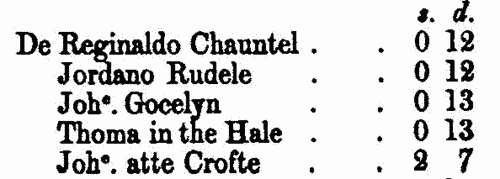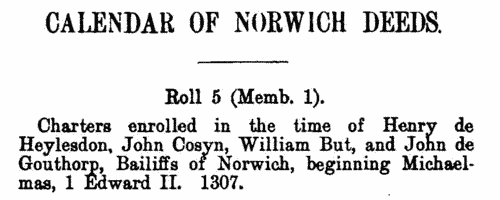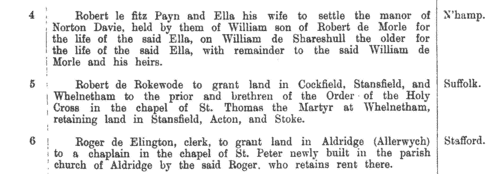Spendelove Surname Ancestry ResultsOur indexes 1000-1999 include entries for the spelling 'spendelove'. In the period you have requested, we have the following 11 records (displaying 1 to 10): Buy all | | | Get all 11 records to view, to save and print for £58.00 |
These sample scans are from the original record. You will get scans of the full pages or articles where the surname you searched for has been found. Your web browser may prevent the sample windows from opening; in this case please change your browser settings to allow pop-up windows from this site. Clerks and Clergy in Yorkshire, Nottinghamshire, and parts of Lancashire
(1266-1279)
The register of archbishop Walter Giffard of York, containing general diocesan business, mostly relating to clergy, was edited by William Brown for the Surtees Society and published in 1904. The ancient diocese of York covered all of Yorkshire and Nottinghamshire, as well as Lancashire north of the Ribble, southern Westmorland, and Hexhamshire in Northumberland. But there are few entries relating to the archdeaconry of Richmond, and few about the peculiar jurisdictions of Southwell, Ripon, Beverley and Hexham. The dioceses of Carlisle and Durham, both in the province of York, are hardly mentioned. Archbishop Giffard spent much of his pontificate away from his diocese, and the register has gaps: but at least it survives, unlike those for his immediate predecessors, Sewall de Boville (1256-1258) and Godfrey de Ludham (1258-1264). Moreover, there are ordination lists (pages 187 to 198) of acolytes, subdeacons, deacons and priests ordained in 1267 to 1274. These usually give full name, and indicate whether the man was 'religious' (a monk or friar), and whether his 'title' (sponsorship) arose from his own patrimony, but 'title' is not usually otherwise specified. SPENDELOVE. Cost: £4.00.  | Sample scan, click to enlarge

| Patent Rolls: entries for Lincolnshire
(1279-1280)
Calendars of the patent rolls of the reign of king Edward I are printed in the Calendars of State Papers: but these cover only a fraction of the material on the rolls. From 1881 to 1889 the reports of the Deputy Keeper of the Public Record Office also include calendars of other material from the rolls - about five times as many entries as in the State Papers - predominantly mandates to the royal justices to hold sessions of oyer and terminer to resolve cases arising locally; but also other general business. The calendar for the 8th year of king Edward I [20 November 1279 to 19 November 1280], hitherto unindexed, is covered here.SPENDELOVE. Cost: £6.00.  | Sample scan, click to enlarge

| Cheshire Pleas
(1293)
Civil pleas for Cheshire were recorded in abbreviated Latin on parchment and sewn together in annual rolls, preserved at Chester castle until the 19th century, when they were removed to London. The great majority of these are unpublished: this is a transcript by David Bethell of the court's proceedings on Tuesday 26 May 1293. CHES 29/7SPENDELOVE. Cost: £8.00.  | Sample scan, click to enlarge

| Cheshire Pleas
(1293)
Civil pleas for Cheshire were recorded in abbreviated Latin on parchment and sewn together in annual rolls, preserved at Chester castle until the 19th century, when they were removed to London. The great majority of these are unpublished: this is a transcript by David Bethell of the court's proceedings on Tuesday 14 April 1293. CHES 29/7SPENDELOVE. Cost: £8.00.  | Sample scan, click to enlarge

| Taxpayers of Portslade and Atlingworth, near Brighton, in Sussex
(1296)
This roll of a tax of an eleventh assessed on the inhabitants of the rape of Lewes in Sussex was delivered to the Treasury in May 1296: the roll, remaining among the Carlton Ride Manuscripts (E. B. 1781) was edited and annotated by W. H. Blauuw, and published by the Sussex Archaeological Society in 1849. SPENDELOVE. Cost: £6.00.  | Sample scan, click to enlarge

| Chancery Warrants
(1244-1326)
Warrants were issued by the kings of England to the royal chancery: most of these warrants led to further proceedings which are recorded on the Charter Rolls, Patent Rolls, Fine Rolls, Close Rolls or the Inquisitions: but archivists have identified a large number of warrants for which there are no such equivalent records, and those for the reigns of Edward I and Edward II are gathered here. Most of the entries relate to England and Wales, but with occasional items referring to Ireland and the English possessions in France.SPENDELOVE. Cost: £4.00.  | Sample scan, click to enlarge

| Inhabitants of Norwich
(1307-1341)
This calendar of the deeds enrolled from 1307 to 1341 was compiled for the corporation by Edith Crosse (MacKinnon), indexed by Walter Rye, and published by the Norfolk and Norwich Archaeological Society in 1915. They are set out chronologically, translated from the original Latin into English, giving the name and occupation of grantor and grantee, and naming the parish in which the property lay. Precise dates are not given, just the regnal year.SPENDELOVE. Cost: £4.00.  | Sample scan, click to enlarge

| Landowners and tenants in Gloucestershire
(1345-1485)
Inquisitions ad quod damnum were held by the appropriate sheriff or escheator (or other officer in whose bailiwick the matter in question might lie) to investigate cases in which the royal or public interest might be damaged by proposed alienation or settlement of land (especially alienation to religious uses, into mortmain). The key findings from these inquisitions were as to the tenure of the land and the service due from it; its yearly value; the lands remaining to the grantor, and whether they sufficed to discharge all duties and customs due from him; and whether he can still be put upon juries, assizes and recognitions, so that the country be not burdened by his withdrawal from them. Generally speaking, this process had the makings of a system of licensing such alienations, and raising money in proportion to the valuations. Equally, there are many items that deal with subjects such as the closing of public roads, the felling or inclosing of woods, or the proposed grant of liberties or immunities. A calendar of these inquisitions from the 19th year of the reign of king Edward III to the 2nd year of Richard III was prepared by the Public Record Office and published in 1906. We have now indexed this calendar by surname and county. Most of the individuals appearing in the calendar are either pious individuals seeking to make grants to religious bodies for the sake of their souls; or landowners securing the disposition and settling of their real estate. But some other names do appear - tenants, trustees, chaplains and clerks.SPENDELOVE. Cost: £6.00.  | Sample scan, click to enlarge

| Retired monks, nuns and chantry priests in the east Midlands
(1547-1551)
Lists of pensions being paid to monks, nuns and chantry priests in the diocese of Lincoln after the dissolution of the monasteries and chantries. The diocese covered Bedfordshire, Buckinghamshire, part of Hertfordshire, Huntingdonshire, Leicestershire and Lincolnshire. Oxfordshire, Northamptonshire and Rutland, which had been shorn from the diocese, are not covered by these returns.
SPENDELOVE. Cost: £6.00.  | Sample scan, click to enlarge

| Tradesmen of York
(1272-1558)
No man or woman could trade in the city of York without having obtained 'freedom' of the city.Their names were recorded on the 'Freemen's Roll', or Register of the Freemen of the City of York, which contains about 19,900 names for this period. A list of names was prepared for each year, the year being here reckoned as starting at Michaelmas (29 September) until 1373, and thence at Candlemas (2 February). Each annual list starts with the name of the mayor and the camerarii or chamberlains. The chamberlains were freemen charged with the duty of receiving the fees of the new freemen; of seeing that only freemen traded in the city; and of preparing this roll, which was compiled from the names on their own account books from the receipts for the fees. There are three groups of freemen: those who obtained freedom after serving out an apprenticeship to a freeman; the children of freemen; and those who claimed freedom by 'redemption', i. e. by purchase or gift from the Mayor and Court of Aldermen.
SPENDELOVE. Cost: £2.00.  | Sample scan, click to enlarge

|
| 1 | 2 |  |
Research your ancestry, family history, genealogy and one-name study by direct access to original records and archives indexed by surname.
|












